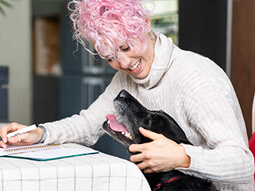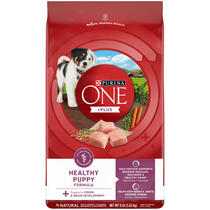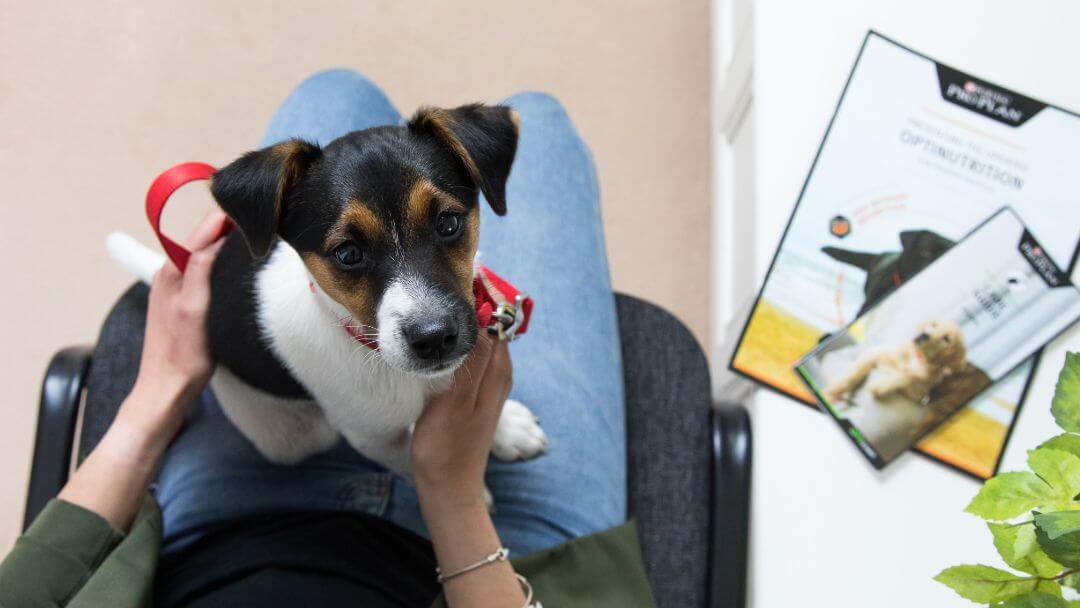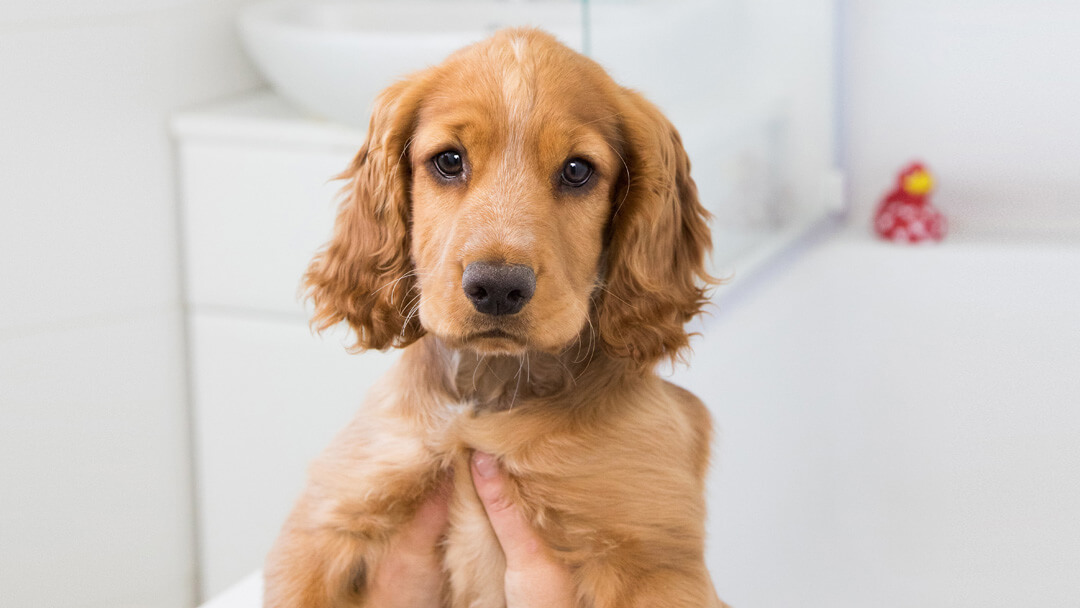

We answer some of the most common questions owners have about puppy neutering and spaying.
Bringing a mischievous bundle of fur home is so much fun. When you’re teaching your puppy to sit and tickling their tummy, it’s unlikely that the thought of them having their own litter will even cross your mind.
However, puppies can start to reach sexual maturity from around 6-7 months old up to 18 months, dependent on their breed size, and may therefore become pregnant earlier than you might otherwise have realised! As a new dog owner, you’ll have to think about whether you want your dog to breed or not from a relatively early age. Neutering your dog will help them avoid any unplanned pregnancies and may have a number of other health, behavioural and social benefits. However, there are also some disadvantages, and depending on your particular puppy these may outweigh the advantages of neutering, even if you do not want to breed from them. Your veterinary practice should be able to help you decide what is best for your puppy.
What is neutering?
Surgical neutering
Neutering is a common operation which involves surgically preventing pets from reproducing by removing some or all of the reproductive organs. For male puppies this involves the removal of the testicles, and is called ‘castration’. For females the procedure means the removal of their ovaries and sometimes uterus, and is called ‘spaying’.
In male dogs, neutering tends to be minimally invasive unless the dog’s testicles haven’t dropped. If your dog’s testicles haven’t dropped by 6-9 months of age, then they will need to be assessed by your vet. These dogs should not be bred from.
For bitches, neutering is slightly more invasive than in males. It may be performed by an incision along her tummy to remove the ovaries and uterus. Alternatively, some veterinary practices offer the option of spaying via keyhole surgery, which is less invasive and may speed up recovery time. However, the decision as to which approach to take should be based on a discussion with your vet.
Both operations are carried out under general anaesthetic. They will involve a small risk – as with any surgical procedure – but techniques and monitoring during anaesthetic minimise risks as much as possible. It also means your puppy will not feel any discomfort during the procedure. Pain relief and anti-inflammatories will also be provided by the veterinary practice at the time of the procedure, and you will often also be given some to take home as part of your puppy’s aftercare. You will also usually have one or two post-operative checks with your puppy, with a vet or vet nurse. This will enable them to monitor healing, and remove any stitches at the appropriate time if, in female dogs, stitches have been placed.
If and when you are thinking about neutering your puppy, the best source of reliable information and advice is your vet. They will be able to answer any questions that you may have about what is involved in the procedure, possible side effects, the cost of neutering a puppy, and more.
Chemical neutering
There may be reasons you would prefer not to have your dog neutered surgically. In these cases, it is also possible to administer injections and tablets that can prevent your dog from breeding. This avoids surgery, and does enable your pet to breed later in life if wished, but the treatment does need to be administered regularly. There is some risk of side effects and there is an ongoing cost, but this may be a preferential option for some dogs. Your vet will be able to provide further information on this option.
When should I neuter my puppy?
Your dog or bitch will start to reach sexual maturity from around 6-7 months old up to 18 months, dependent on the size of the breed. The best age to neuter is a controversial subject and does differ according both to the size and breed of your dog.
If wanting to avoid unwanted pregnancies it may be better to neuter your puppy at a younger age, and neutering can be carried out before the first season in females, but some vets will advise waiting longer. Particularly in larger breeds, especially male dogs, waiting until fully mature may be advised.
There is no clear evidence of the optimum approach, however, and you should discuss what may be best for your individual puppy with your vet.
What are the advantages and disadvantages of neutering my puppy?
There are several health, behavioural and social reasons why neutering your puppy may be advisable and likely to be of benefit to them, and to you. However, although there are plenty of advantages there are also some potential disadvantages and neutering may not be an appropriate decision for every dog. The benefits of the procedure also vary depending on gender.
- Neutering prevents testicular tumours and reduces the risk of prostate cancer and other prostate diseases.
- Neutering can reduce the natural aggressive impulses and have other beneficial effects on behaviour. However, this is not the case in every puppy and it may worsen fear aggression. If you do feel your puppy is demonstrating behaviours that are problematic ,it is advisable to discuss the benefits and potential disadvantages of neutering with your vet or a qualified behaviourist before castration.
- Neutering can help to prevent your dog straying away from home in search of a female or approaching females in season when on walks.
- Neutering may improve scent / territory marking behaviour and trying to mate with objects/people.
- However, neutering does tend to decrease the pet’s metabolic rate, which means your puppy may be more prone to weight gain after neutering.
- There are also links between neutering and increased risks of developing intervertebral disc disease (in miniature dachshunds), joint diseases (particularly in golden retrievers), and some types of cancer (in several different breeds). This appears to be influenced both by age of neutering and the breed.
- Neutering reduces the chances of her developing breast (mammary) cancer.
- Spaying will prevent uterine and ovarian cancer, as well as other life-threatening uterine infections such as pyometra, which occurs relatively commonly in older unneutered bitches and can be fatal.
- Spaying removes the risk of an unwanted pregnancy, which is a significant responsibility for you having to care for your dog during pregnancy and after her puppies are born, and having to raise the puppies. Spaying is also particularly important if your pet has an inherited health condition in order to prevent them breeding and passing these onto their puppies.
- Spaying also removes the risk of phantom pregnancies.
- Female dogs in heat can produce bloody discharge for up to three weeks, which many owners may find unpleasant.
- However, neutering does tend to decrease the pet’s metabolic rate, which means your puppy may be more prone to weight gain after neutering.
- Spaying can increase the risk of urinary incontinence in females. Most females will respond well to medications if this develops.
- There are links between neutering and increased risks of developing intervertebral disc disease (in miniature dachshunds), joint diseases (particularly in golden retrievers), and some types of cancer (in several different breeds). This appears to be influenced both by age of neutering and the breed.
How do I get my puppy neutered?
To get your puppy neutered, book an appointment with your vet. You may be required to bring your puppy in for a pre-anaesthetic check-up before they have the operation.
Your vet will request that you don’t feed your puppy for several hours before their anaesthetic, usually from the night before.
You will usually be asked to drop your puppy into the vets in the morning, and you should be able to pick them up later that day.
If you want to neuter your puppy but cannot afford the cost, speak to your local animal charity as many organisations offer financial assistance to help you cover the cost of neutering a puppy.
What post-surgery care will my puppy need after being neutered?
Recovery tips after neutering:
- Stay near to your puppy for the first night after their operation.
- Your puppy might whimper or whine as they recover from the anaesthetic. Don’t worry – this may just be because they are disorientated. If it continues for a prolonged time, however, contact your vet.
- Puppies can sometimes experience an upset tummy as an adverse side effect of the anaesthetic. Your vet may recommend a post-operative recovery diet for you to take home and feed your puppy for their first few meals after their operation. A bland diet such as this can help to minimise the likelihood of an upset tummy.
- Ensure any medications provided by your vet for their post-surgery care, such as anti-inflammatory medications and pain relief, are given.
- Your vet may organise post-operative check ups several days after your pet’s operation to monitor their recovery.
- Your puppy can go outside the day after his/her operation, but walk them on a lead until they are fully recovered and given the ‘all-clear’ after their post-operative check-ups.
- To stop your puppy from licking or scratching at their surgical site, they may have to wear a buster collar for up to 10 days after their operation. If your puppy finds this very uncomfortable a t-shirt may be more appropriate option. Buster collar or ‘cones’ are often taken off when your puppy is eating.
- In females, if keyhole surgery has not been performed, then your puppy will have an incision on her abdomen with some stitches in it. This wound should be checked regularly to ensure it is clean and healing well.
- To protect your puppy’s stitches and allow them time to heal, prevent her from jumping and walk her on a lead until she is given the ‘all-clear’ by the vet. If non-dissolvable stitches are used, your vet will provide a date when they should be removed. This is usually around 7-10 days after the procedure. Male dogs usually do not require external stitches.
What changes can I expect after neutering?
Sometimes neutering is associated with weight gain due to the hormonal changes that take place after neutering. You can help them stay fit with regular exercise and by proactively moving them to a lower-calorie food or 'light' food to help prevent weight gain after neutering. Alternatively, you may prefer to reduce their calorie intake by reducing their food portion by 10%. If this is done your pet should not gain any weight. Read our information on feeding your puppy for further guidance.
Next, find out how to help your dog recover from an operation with our easy-to-follow guide.












